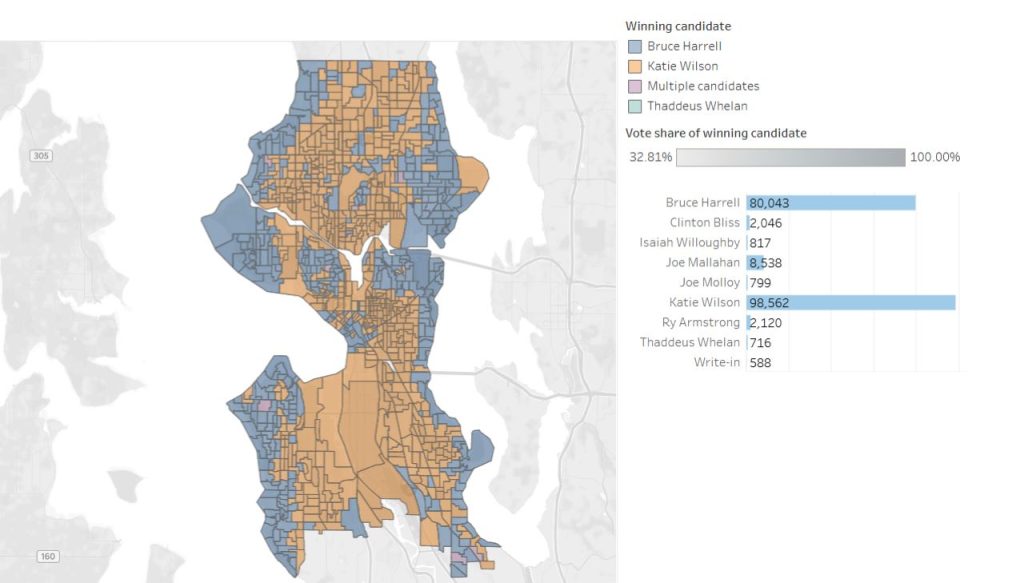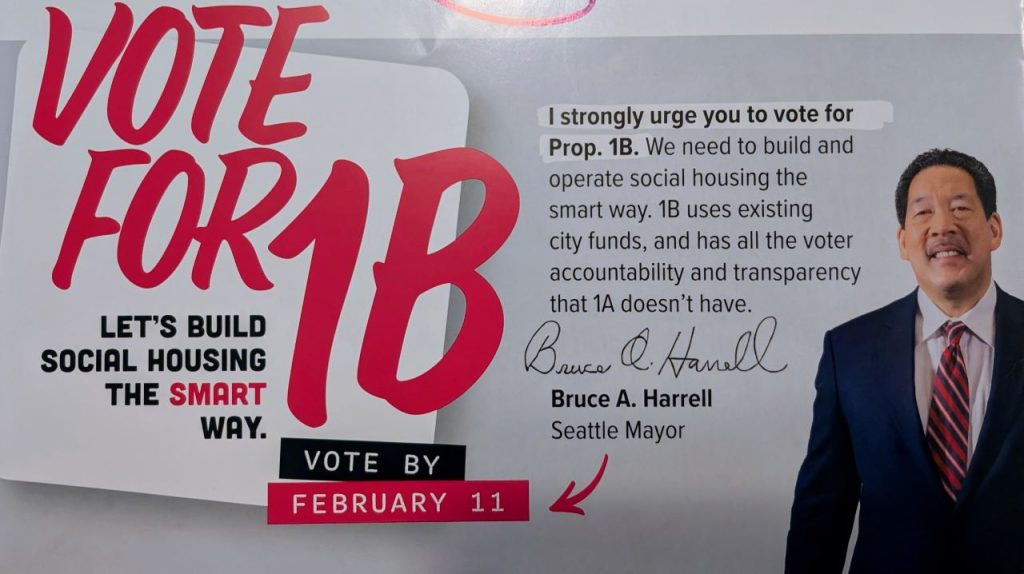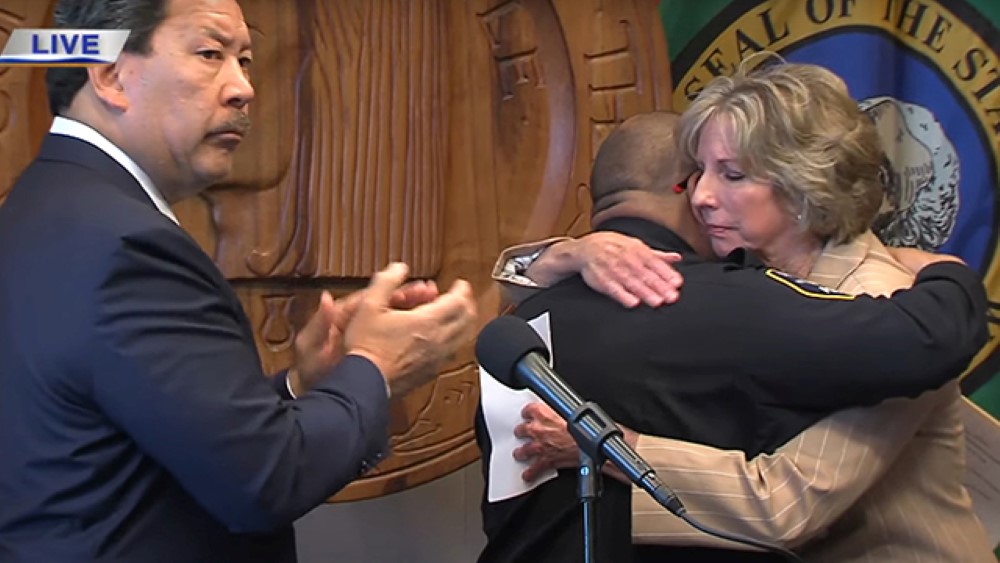Mayor Bruce Harrell is seeking to fend off a strong challenge from Seattle Transit Riders Union head Katie Wilson, and he took a combative tone in the first debate of the general election season. Seattle Channel’s City Inside Out aired the debate Friday, with Brian Callahan moderating. Harrell frequently spoke over his opponent, as he sought to portray her as inexperienced and ill-equipped for the office he’s held for the last four years.
Challenging Harrell from the left, Wilson won the August primary by nearly 10% — a margin of more than 18,000 votes — stunning those who thought the seasoned incumbent was a lock for reelection. With a gap to close in order to win reelection, Harrell was clearly on the offensive.
“It almost feels like Harrell’s slogan for this campaign is: we can’t do better,” Wilson quipped in one exasperated moment, as Harrell continued to nitpick her plans rather than focus on his own performance and vision for the next four years.

Repeatedly, Harrell posed attempts at ‘gotcha’ questions to Wilson, hoping to paint her as unqualified and land a knock-down punch that could stir up the race. Meanwhile, Harrell presented his own record in office as virtually unassailable.
Harrell noted he had twice been elected by colleagues to be city council president during his 12 years on city council and had been managing partner at a law firm, which he contended demonstrated his executive leadership skills. Boldly, the mayor claimed he had received no complaints from the 14,000 City workers serving under him, which papered several complaints about a poor workplace environment and patterns of sexual harassment that have gone unchecked.
“She’s never led anything,” Harrell said. “Number one, just look at her background. I mean, she’s run a nonprofit of one employee. An executive has to make some tough decisions. Okay, sometimes this could be reprimanding an employee, terminating employee, and when you run an organization of 14,000 employees, you have to make these tough decisions.”
Wilson countered that Transit Riders Union had more than one employee and that the model was built around mobilizing dues-paying members and volunteers and doing coalition work that brought other groups together for a common goal. From the beginning, Wilson’s pitch to voters was centered on her track record doing that coalition-building to enact progressive policy wins like the JumpStart payroll expense tax that saved the City budget amid the pandemic, reduced transit fare programs, expanded tenant protections and assistance, and raising the minimum wage in neighboring cities like Tukwila and Burien.
Wilson also fired back to note the pattern of bad hires by Mayor Harrell.
“The job of mayor is about assembling and managing a team, a team of people with integrity, people of competence, keeping them oriented toward a common vision and keeping them motivated,” Wilson said. “And that is exactly the work that I’ve been doing my entire career, and I think what we have seen in the last four years under you, Bruce, is a demonstrated failure to do that effectively. Okay, it’s not just Diaz. You hired your high school buddy to lead the KCHRA [King County Regional Homelessness Authority] at a very sensitive time for that organization, and that was a disaster, and he had to resign. You hired an External Affairs Coordinator that resigned under allegations of sexual assault. And you know, if you have one bad hire, that’s one thing, but when that becomes a pattern, at some point, you have to begin to question the judgment of the person who is assembling that team.”
The candidates sparred over homelessness response. Harrell claims to have created 3,000 units of emergency housing, but those claims do not hold up to scrutiny. PubliCola‘s Erica Barnett flagged the problems with Harrell’s list includes projects that were funded before he took office and several projects that were abandoned due to local opposition or other obstacles.
While Harrell came up short on his own pledge to build 2,000 units of emergency housing in his first year, he harangued his opponent for pledging to stand up 4,000 units of emergency shelter in four years, which he said would be too expensive and face too many obstacles. He pressed Wilson to identify funding for her plan, repeatedly badgering her for an exact figure. Wilson pointed to using existing funding more effectively, such as spending less on aimless encampment sweeps, and raising new progressive revenue. She also highlighted that shelter capacity space had shrunk under Harrell’s watch.
“What we’ve seen over the last four years is that Seattle has lost shelter capacity every single year that Mayor Harrell has been in office,” Wilson said. “We have more people sleeping unsheltered on our street than we did four years ago. We have two homeless people for every shelter bed. Like the numbers don’t lie, and this contributes to our public safety problems too, right? Because the mayor’s policy of removing encampments, sweeping people around without actually providing the shelter and the support that people need to be successful there destabilizes people, right? And especially when people are struggling with substance use disorder and mental illness, right? It means that they’re more likely to contribute to our public safety problems.”
The candidates disagreed sharply about social housing as well. Wilson argued Harrell had sought to undermine the project, while Harrell said he was worried about the new tax causing a business exodus and had done enough to help the effort.
“Bruce was the face of the opposition to that campaign funded by Amazon, Microsoft, and the Chamber of Commerce,” Wilson said. “This it is very important that we get this project right. We have a new social housing developer. There are complicated issues of governance and financing that need to be put together in the right way for this to be successful. People around the country are looking at this experiment in Seattle and seeing whether it’s going to be successful or not. We need city leadership that is going to fight to make it work. And Harrell not just in his support of the opposition campaign, but in other things that he’s done over the last couple of years as mayor, has done nothing but try to undermine that project, and it’s not going to work unless it has strong collaboration from the mayor’s office.”

Harrell argued that the loans his administration had negotiated to stand up the Seattle Social Housing Developer signaled his cooperation. While the grassroots social housing measure Proposition A won by 26 points in February, Harrell continued to make the case that the high earners’ tax Prop A authorized risks stunting business growth.
“We wanted it to be funded in the existing payroll expense tax, because we need those businesses to stay in Seattle, as we’re hemorrhaging businesses out of business downtown Seattle, that hurts us,” Harrell said. “That’s how we filled potholes. That’s how we feed the hungry.”
Public safety was also a flashpoint in the debate, with Wilson arguing Harrell had bungled the hiring of his first police chief Adrian Diaz, who the mayor ousted in December amid numerous scandals, which contributed to low morale and retention issues at the Seattle Police Department (SPD).
“[Crime] has actually come down more slowly in Seattle than in other cities around the country. We had a spike when other cities were falling, during your tenure, and it’s not hard to understand why that happened,” Wilson said. “You hired and stood by Adrian Diaz as police chief, and under his reign, SPD lost many high integrity career officers, morale tanked. So, we’ve had a dysfunctional police department.”

Seattle’s newly expanded CCTV surveillance pilot program was another area of sharp divides. Agreeing with the vast majority of public comment against the expansion, Wilson argued the City was rushing the expansion and the risk was too great of surveillance data falling into the federal hands and being misused, including in aiding Trump’s mass deportation efforts.
Harrell provided his personal guarantee that wouldn’t happened, and argued Wilson did not clear for communities of color — despite the aforementioned swell of public criticism of the proposal which included many people of color and the city’s own Office of Civil Rights and its Community Policing Commission.
“The people of color and people from immigrants or refugees communities who are asking me for tools to become safe now we will address all of the concerns about federal overreach, the misuse of surveillance,” Harrell said. “I remind everyone I was the one that authored the privacy surveillance ordinance. I was the one that authored the bias free policing. So how rich is it for this person to talk about protecting my community? My mother was interned through an executive order. This is very personal. I will never allow my community to be over-surveilled by government technology.”
Author’s note: The Urbanist Election Committee, on which I serve, endorsed Katie Wilson.
Doug Trumm is publisher of The Urbanist. An Urbanist writer since 2015, he dreams of pedestrian streets, bus lanes, and a mass-timber building spree to end our housing crisis. He graduated from the Evans School of Public Policy and Governance at the University of Washington in 2019. He lives in Seattle's Fremont neighborhood and loves to explore the city by foot and by bike.

